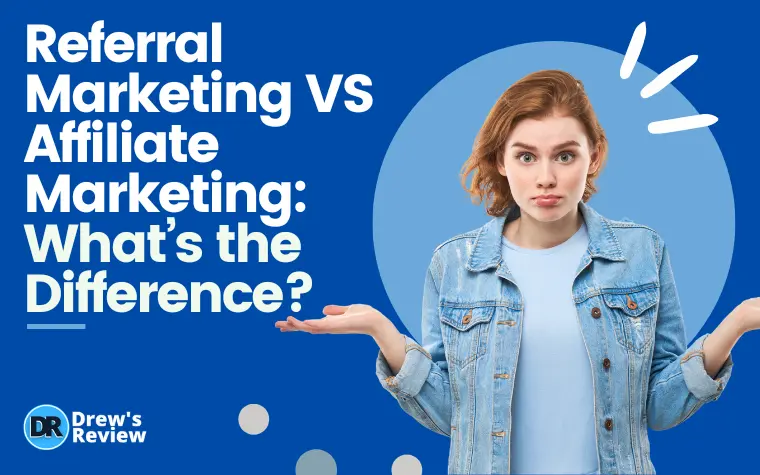
You might be wondering what the difference is between referral marketing and affiliate marketing.
They are both similar but also have some key differences.
The main difference is that referral marketing is where customers of a certain product refer their friends and family to that product or service. If they sign up, a reward is given. Affiliate marketing is when you have a 3rd party affiliate promoting products and services in exchange for a commission on every sale.
So what is the best option either for your business or if you want to promote products via either option?
All will be discussed in this article. Let's get started.
What is Referral Marketing?

Referral marketing opens up a world of shared relationships between current customers, their friends and family, and your brand.
By leveraging these connections, you can build positive experiences with potential new audiences that create loyalty to your business for years to come.
Rewards can range from discounts on future purchases, gift cards, cash-back rewards, free products or services, etc.
You may have done referral marketing at some point. Perhaps you have subscribed to a service and were given referral links to give to your friends and family to get a discount for the same product.
If the company has a referral program, they will provide you with this unique link. It's different than others on the same referral program. That is how they know you made the referral, because it is traceable.
Examples of Referral Programs
Some companies that have referral programs are:
These are just a few examples of companies with referral programs. To qualify, you must either have bought the product or subscribed to the service. Each one of them has its own terms.
What is Affiliate Marketing and How is it Different?
Affiliate marketing is where you promote a product or service without having to be a member like with a referral program.
You can join for free, get a unique affiliate link and then promote that link either in blog posts on your website, YouTube, social media, paid ads, or even email marketing.

You aren't going to try to "recruit" your friends and family and essentially you are marketing to people all around the globe that you don't know and will likely never meet or speak to.
There are individual programs you can join along with networks like Clickbank, ShareASale, CJ, and so on.
How Much Money Can you Make WIth Referral Marketing?
In a nutshell, the more friends and family you have, the more you can make. Rewards are not always given in cash, but usually in rewards points, free products or services, and discounts.
Depending on the program, you could either pocket some money or just save money by getting discounted services.
So if you have a large network of friends and family, referral marketing can be a great way to make some extra money while promoting your favorite product or service.
What Pays More, Referral Marketing or Affiliate Marketing?
It depends on you really. Let's say for example you have a ton of friends and family and you are a member of several brands. You could use referral marketing to earn rewards or discounts from those brands, plus you can make money from referring your friends and family.
Affiliate marketing on the other hand is a more passive way to make money as you don't need to actively refer anyone or be a paying customer of these products or services.
All you need to do is find products or services and join their affiliate programs which are free. Then it's just a matter of promoting them via social media or blog posts, and you will get paid for every sale made through your links.
So ultimately which one pays more?
Affiliate marketing will generally pay more in the long run, but it does require a lot of work and dedication. Your audience pool with affiliate marketing is MUCH larger than just your friends and family. That's why there is much more opportunity.
Keep in mind it depends on the product(s) you are promoting, how much the commissions are and the audience you have, and how much effort you put into your affiliate marketing business.
Plus, you could work with multiple brands at once instead of just one. This can give you a bigger revenue stream over time compared to referral marketing.
Pros of Referral Marketing For Business Owners
- It’s an easy way to increase sales and reach new customers
- It can be used to reward loyal customers, who will in turn spread the word about your service or product
- You can quickly build a base of referrals by incentivizing existing customers
- Referral marketing is cost-effective as there are no paid advertisements required
- It helps you engage more with your customer base and builds trust
Cons of Referral Marketing For Business Owners
- Limited Reach: Referral programs are limited to the customer base of the business, so they may not be able to reach as many potential customers as an affiliate program.
- High Cost: Referral programs can be expensive to set up and maintain, especially if businesses choose to offer incentives for successful referrals.
- Time-Consuming: Referral programs require a lot of time and effort in order to be successful, as businesses need to constantly monitor and manage them in order to ensure that they are running smoothly.
- Difficult To Track: It can be difficult for businesses to track the success of their referral program, making it hard to measure its effectiveness and ROI.
- Risk Of Fraud: There is always a risk of fraud when it comes to referral programs, as customers may try to game the system by referring themselves or using fake accounts in order to get rewards or discounts.
Pros of Referral Marketing as a Customer
- Get rewarded with free products or discounts
- Receive cash rewards when you refer someone
- Enjoy exclusive offers and deals that are only available to customers who have referred others
- Increase your network of contacts that can help you in various aspects of life
Cons of Referral Marketing as a Customer
- You will only receive rewards if someone you refer actually buys the product or service
- Referral programs can be limited to certain customers or geographic locations
- The referral process may require a lot of time and effort, such as sharing links with friends and family members - this could lead to tension by annoying them!
- If your friend/family member cancels their purchase, you won’t get any reward for referring them
- You could potentially miss out on better rewards offered by other companies through an affiliate program
Pros of Affiliate Marketing as a Business Owner
- Low Cost: Affiliate marketing can be an extremely cost-effective way to acquire new customers because businesses do not need to pay for advertising or invest in other forms of marketing. Instead, they only pay affiliates when customers purchase a product or service through their links.
- Wide Reach: With an affiliate program, businesses are able to reach potential customers all over the world and increase their sales exponentially.
- Trackable Performance: Unlike referral programs, affiliate programs have tracking software that allows the business to monitor the performance of each individual customer or link and measure its effectiveness in terms of ROI.
- Access to Top Publishers: By joining an established network, businesses can access high-quality publishers and websites which can help them reach more potential customers and bring in more revenue in the long run.
- Increased Brand Awareness: Affiliates are generally incentivized to promote products and services on their websites and social media channels, so by working with them, businesses can increase brand awareness among different demographics and geographic locations.
Cons of Affiliate Marketing as a Business Owner
- Low Conversion Rates: Even though affiliate programs can have a wide reach, the conversion rates can be quite low due to factors such as the nature of the product and who is doing the promoting
- High Competition: There is always a high level of competition among affiliates and businesses in affiliate networks. If you don't set yourself apart from other competitors, it can be difficult to get noticed and attract affiliates
- Lack of Loyalty: If an affiliate finds a similar product with a higher commission, they will likely leave
Pros of Affiliate Marketing as an Affiliate Marketer
- You can work from anywhere and anytime
- You don't need any specific qualifications or certifications
- Flexibility in choosing the products/services you want to promote
- Potential for passive income with affiliate marketing
- Ability to scale your earnings by working with multiple brands simultaneously
Cons of Affiliate Marketing as an Affiliate Marketer
- Some niches can be super competitive and hard to compete with
- Some networks can take up to 2 months to pay out
- The program could get canceled at any time
- Some networks have certain qualifications you need to get accepted
So What's Better, Referral Marketing or Affiliate Marketing?
Many businesses these days are using an affiliate and a referral marketing strategy together. It doesn't cost them any money because they are only paying out when someone converts in both scenarios. Both marketing types have their advantages and disadvantages that should be taken into consideration before deciding which one to pursue.
Referral programs are great for acquiring customers quickly, at a low cost, and with minimal effort from the business. However, they can also be limited in terms of reach and rewards compared to affiliate programs.
As an individual, think of referral programs as more of a quick buck or hobby. You'll never get rich off a referral program because most of them are used to acquire customers and not reward you with a huge commission.
Affiliate marketing, on the other hand, can be a great way for entrepreneurs and bloggers to make some serious money. You have access to a wide network of potential customers and are often rewarded significantly for your efforts. The downside is that it requires more effort from you as an affiliate marketer and there is still competition out there which can make it harder to succeed.
Is There Training for Getting the Most Out of Affiliate Marketing or Referral Programs?

As an individual, you won't need any training for referral programs because the company you are with that has this program will often have all the information you need to know.
Affiliate marketing, however, is more involved and it's best to do your own research and take online courses to get up to speed on the different strategies available.
I have many suggestions for great courses right here on my site so I encourage you to take a look.
Wrapping This Up
In conclusion, both referral marketing and affiliate marketing have their strengths and weaknesses that should be taken into account. By now you should understand which one will better suit your business goals.
Between the two, one is not better than the other. It really depends on what works best for you.
Related Articles
- How I Make Faceless YouTube Channels With AI - April 9, 2024
- Top 21 Faceless YouTube Niches to Earn Big Profits in 2024 - April 3, 2024
- Dave Nick YouTube Automation Systems Review 2024 - March 28, 2024
